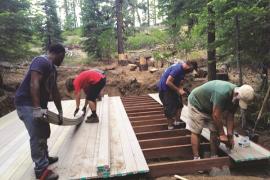Let me introduce Pat, a thirteen-year-old returning for his second summer at camp. Little distinguished his first year at camp, but this season he has a definite attitude problem. It showed up immediately in the ragged look of his clothes. As introductions were made on opening day and plans began to form for the summer, Pat was distinctly indifferent to all the hype given to the opportunities ahead. As the first week progressed, his lackadaisical attitude became more obvious in half-hearted efforts at completing morning cabin chores, passive interests in establishing activity goals, and an emerging antagonism toward his cabin mates who were excited to be at camp. When confronted by his counselor, Pat's response was a version of "whatever," " you are clueless," or "I don't care."
His poor attitude persisted throughout two-and-a-half weeks of camp despite interventions by cabin counselors, a unit leader, and the camp director. As strategies were almost exhausted, the increasingly apparent next step was removal from the community. Then one afternoon Pat found himself as one of the crew in a sailing regatta. A captain needed an extra crew member, and Pat happened to be hanging out on the pier at just that moment. He was put on board - but certainly not by choice. The wind was a crisp 15 knots, the competition was challenging, and the outcome required the best of everyone on board.
During that regatta, something significant happened to Pat. He returned to the pier a different boy. He had a new enthusiasm to learn to sail. He told the dock master he wanted to move from crew to captain, to hold the tiller in his hand. This new energy spilled over to his cabin with a greater interest in completing chores and an eagerness to join his cabin mates in activities.
The change was obvious. An underachieving, passive indifference had been replaced by an ambitious, enthusiastic excitement. The significant experience was a simple sailing regatta on an afternoon at camp. The power and potential of that experience is a vital and necessary contribution to the education of youth.
Defining Camp's Educational Role
Camp successfully merges the disciplines of recreation and education in an outdoor setting. The means of camp, outdoor experiences, are recreational; the ends of camp are educational. Historically, these educational objectives have carried the camp experience beyond academic, athletic, or theological issues to focus on attitudes. Your camp has the unique opportunity to help youth acquire and strengthen attitudes and spiritual consciousness upon which the school, team, and the church can build. Changing attitudes that campers like Pat arrive with and fostering new ones comprise the unique educational mission of camp.
A focus on attitudes
Given the current menagerie of negative and positive forces competing to influence and capture youth's attitudes, your camp's educational mission is critical to the development of today's youth.
Developmental psychology informs us that the primary task of childhood is to develop a sense of self and an attachment to the family. In adolescence, the task becomes transforming that sense of self by connecting it with the world. For adolescents, emerging into society is filled with many overwhelming tasks, which include clarifying the meaning of male or female, belonging to a particular ethnic tradition, being a citizen of this national community, or living on this tiny planet in an expanding universe. Such complex tasks are not accomplished by just growing older. Children need to be nurtured and guided by purposefulness that will form their attitudes and help them develop into contributing members of our communities.
Camp Shapes the Soul
Successful passage into the rough waters of society hinges on the development of an adolescent's soul. David Oldfield, in his article "The Journey of the Adolescent Soul," identifies five significant phases in this passage from childhood to adulthood. The journey begins with the soul awakening to itself. The individual becomes aware of his/her power, choice, independence, and direction. With this awakening, the individual moves next to seek his/her own path, independent of family and peers. This journeying into new territory brings the individual into the third phase of this passage, trials and obstacles, which are essential elements in the soul's discovery of its uniqueness and its place in the community.
Following these experiences of testing come a time for self-reflection and integration where the lessons learned from these difficulties can be incorporated into the individual's life direction. The fourth step is followed by the last phase of the adolescent's journey: a ceremony or formal acknowledgment of growth. Rituals and ceremonies provide significant markers, anchoring these moments of growth. Helping youth along this journey of discovery is at the center of camp's educational mission.
Recognizing the dangers
Unfortunately, in our culture there are few structured opportunities to assist adolescents through this coming-of-age journey. A failure to honor the inward passage of adolescence with vision quests or dream walks often allows the volatile energy of youth to seek its own path. The Carnegie Council on Adolescent Development warns that the nation is "neglecting its 19 million young adolescents to such an extent that half of them may be irrevocably damaging their chances for productive and healthy futures." Increasing rates of suicide, homicide, smoking, alcohol use and abuse, and teenage pregnancy all point to the absence of appropriate programs for directing this youthful creative energy.
Camp's influence
Camp is one of the few effective institutions uniquely positioned to shape and guide the development of the adolescent soul. Adventure activities in the mountains, deserts, lakes, or oceans provide natural attractions and space for the energized explorations of youth. This journey begins with the separation from home for a day, a week, or a season. With this independence comes empowerment. The individual becomes aware of choices and the responsibility for individual direction. With choices and power, the soul begins to emerge as it seeks its own path in setting goals, planning its day, and choosing its associates. Trials and obstacles appear in the adventure activities and the group that is working through them.
In this struggle, the individual learns from experience what is real, what is valuable, and what really matters. These insights become crystallized through the guidance of sensitive, attuned counselors who lead discussions at the end of an activity or at the end of the day, and through those individual moments of quiet reflection that come when the lights go out or before the sun rises.
The Value of Challenge
Two factors are critical in camp programming, the content of the values that shape and inform the camper and the degree of challenge in the program. Today, camps focus on the sense of adventure, which is so important to the success of the program. Keeping youth invested in your camp program long enough to significantly impact their development depends on the sense of adventure you create at camp. The aura of adventure begins with the perception of a journey or experience into the unknown. So often in providing activities from season to season, it is easy for this sense of adventure to get lost in the routine. It takes a good counselor, an intentional program director, and a mission-driven camp director to use the routine to identify new challenges and implement them into programs. Given the dynamics of a new group of people in an outdoor setting, each presents the opportunity of providing a journey into the unknown.
Creating new learning
The challenge experienced in adventure activities creates the opportunity for new learning that is so essential to campers. You can see the process happening in the changes that took place with the apathetic camper, Pat, until he was drawn into a sailing regatta. In the process of the regatta and the challenge with which he was confronted, his behavior changed.
In the heat of the regatta, Pat's old behavior patterns were interrupted. They did not work; these patterns were really in the way. Without even realizing it, Pat began to generate and install more positive patterns to replace the old unproductive ones. In an effort to win and do his part, Pat began to look for better solutions. He began to find answers for himself instead of what had been defined as "cool" by his peers at home.
When he returned to the dock at the conclusion of the regatta, he felt different. It would take some reflection on his part and some guidance on the part of his cabin counselor to help him get a better handle on what he had learned. What he knew at that moment was that something had bloomed in him to make him aware of courage, choice, creativity, and power. A balance was born between the demands and opportunities of the outside world and the needs of his soul.
At the end of your camp session, appropriate ceremonies can mark the significance of the camp events that helped campers return home with more independence, more consideration for those who are different, and more willingness to join together to create a better life for all. Your camp program can provide an effective structure for nurturing the development of the adolescent soul.
Originally published in the 1999 May/June issue of Camping Magazine.


